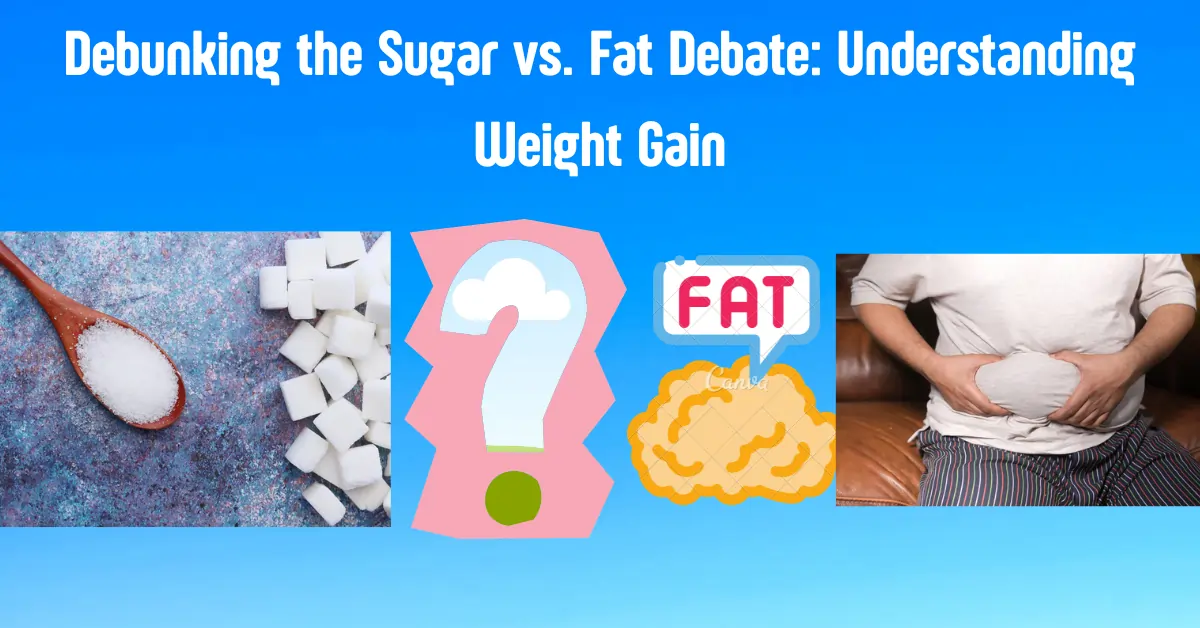The question of whether sugar or fat is the primary culprit behind weight gain has sparked numerous debates. However, it’s important to note that the issue is not as black and white as it may seem. Both sugar and fat play unique roles in our bodies and can impact weight management differently. In this article, we’ll delve deeper into the sugar vs. fat discussion and shed light on the complex relationship between these two macronutrients.

Sugar: Quick Energy with Downsides
Sugar, in its purest form, provides a quick source of energy and enhances the taste of food. However, consuming excessive amounts of sugar can lead to cravings and a reliance on its sweet taste. From a weight management perspective, sugar offers little beyond providing energy, making it counterproductive for those aiming to maintain or lose weight.
Understanding Insulin’s Role:
When sugar intake is high, the body requires more insulin, an anabolic (building) hormone. Increased insulin levels can stimulate appetite and promote fat storage, hindering weight management goals. Moreover, fluctuating blood sugar levels can negatively affect mood. However, it’s important to note that individuals vary in their sensitivity to these effects.
The Brain’s Energy Needs:
While it is true that the brain requires energy to function, it does not necessarily require sugar specifically. Our bodies are intelligently designed to convert the food we eat into the necessary energy sources for our brains. Thus, consuming sugar is not a prerequisite for healthy brain function; alternative sources can fulfill this requirement.
Fat: More Than Just Energy
Contrary to popular belief, fat can play a role in weight management. Although it provides satiety, helping you feel full for longer, fat is also highly energy-dense, containing more than twice the calories per gram compared to protein and carbohydrates. Therefore, moderating fat intake is crucial when aiming to manage or lose weight effectively.
The Benefits of Dietary Fat:
Fat does offer some important benefits. It contains essential vitamins and aids in the absorption of fat-soluble vitamins. Opting for unsaturated fats found in plant-based sources like oils, seeds, nuts, avocados, and fatty fish provides essential unsaturated fats. On the other hand, animal fats tend to contain more saturated fat, which should be consumed in moderation. Striking a balance and including a variety of fats in your diet is key.
The Middle Ground: Unsaturated Fat Triumphs Over Sugar
Comparing sugar and fat to two feuding 5-year-olds helps illustrate the issue. Just as it is rarely accurate to single out one child as the sole cause of the fight, it is unfair to label sugar or fat as the sole culprit in weight gain. Instead, it’s crucial to understand that it is often the combination and quantity of foods consumed that affects weight management.
When faced with the choice between sugar and fat, it is clear that unsaturated fats offer more health benefits. However, it’s important to note that it’s rarely an either-or situation. Rather than completely excluding one or the other, a balanced approach that incorporates both sugar and fat is key. Ultimately, it is the overall diet and the amount consumed beyond our body’s energy needs that impact weight management.
So, the sugar vs. fat debate is complex, and neither can be solely blamed for weight gain. Sugar provides quick energy but lacks significant nutritional value, while fat, when consumed in excess, can contribute to weight gain due to its high energy density. However, unsaturated fats found in plant-based sources are beneficial for overall health. The key lies in moderation, balance, and a diverse diet. Ultimately, achieving and maintaining a healthy weight is influenced by the overall quality and quantity of the foods we consume.

